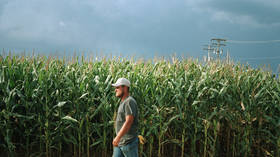France to reap worst corn harvest in decades – Bloomberg

French farmers are harvesting their smallest corn crop in more than three decades, following the worst drought in at least 500 years that has hit the continent, Bloomberg reported this week, citing the country’s agriculture ministry.
According to the report, France’s production of the staple grain used to feed chickens and pigs will drop 25% to 11.6 million tons, which is the lowest since 1990. The adverse weather has reportedly reduced harvests of almost all crops from last year, apart from oilseeds.
“No region is spared from the drop in yield,” the agriculture ministry said.
The smaller crops in France, which is one of Europe’s agricultural heavyweights, could drive soaring food prices even higher. Fields in Germany and Romania, other key EU producers, have also suffered from drought.
According to a report from French-based Strategie Grains, EU wheat crops will also be reduced this year. The agency estimates that the 2022-2023 wheat crop will be around 124.1 million tons, compared to 129.8 million tons in 2021-2022. It also lowered its forecasts for the total grain crop by 2.5 million tons from its August estimates, to 264.6 million tons, which is 25.7 million tons less than in 2021.
While the agency noted that grain prices have largely fallen, high production costs may render this decrease insignificant. Prices in the coming months will depend on the likelihood of an EU recession, which could lead to a further drop in demand, as well as a possible increase in grain exports from Ukraine.
For more stories on economy & finance visit RT's business section












